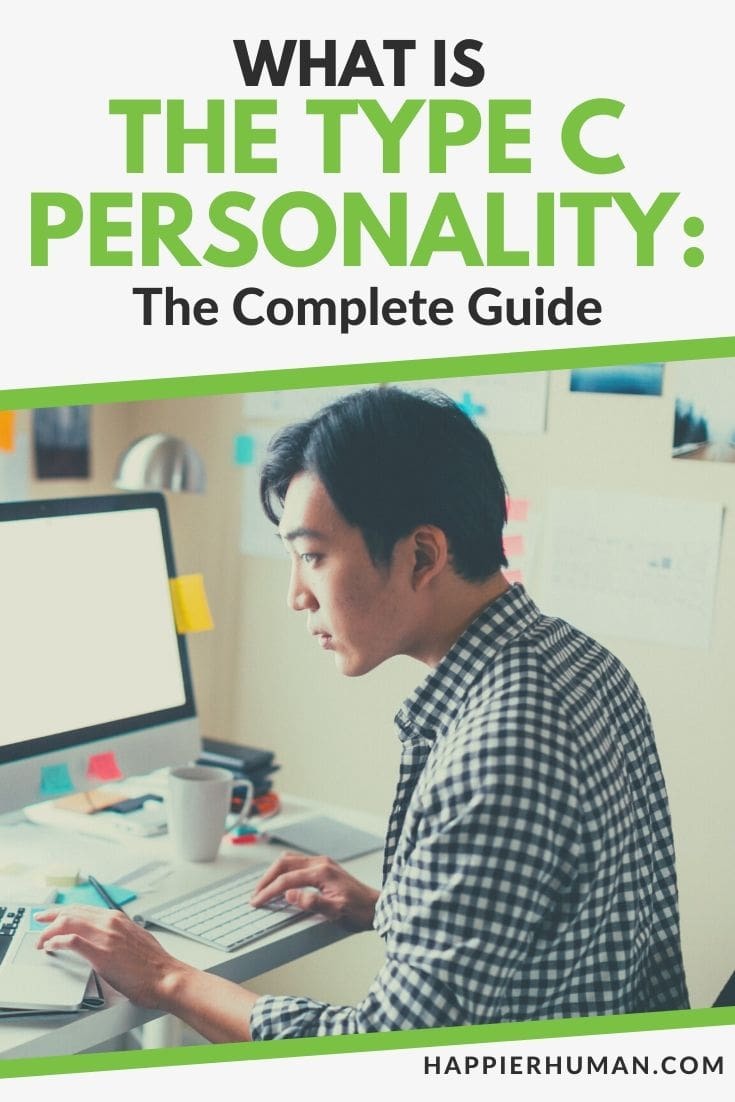The personality, a glimpse into a person’s inner workings, is highly irresistible. It can answer all sorts of burning questions about motivation, reactions and even food preferences.
Most people have heard of Type A and B personalities, but how much do you know about the Type C personality?
Categorizing oneself or others has a very long history that manifested in multiple types of personality tests, from the ones in the supermarket checkout lanes to blind tests in psychology departments.
We all appear to be trying to find ourselves, and some may rely on sun signs and the Chinese horoscopes, while others favor Myer-Briggs, Johari Window, and the Enneagram. But the most basic personality types are those defined by DISC theory.
We have to realize that any system of classification works from the idea of difference. A specific personality type, like Type C, only means something because of how it is differentiated from the other types in the system.
Let's learn more about where these tools came from, and how you can use them to build a better life for yourself.
Where Did the Type C Personality Come From?
The concept of Type A and Type B personalities originated in the 1950’s when cardiologists Meyer Friedman and RH Rosenman tried to determine if certain personality types were predisposed to particular diseases, like heart disease.
Although the theory was disproved, the personality types were linked to different degrees of stress, resulting in the classic duality of Type A and Type B.
Later, psychologist William Mouton Marston developed DISC theory, which posits four profile types, as listed below:
D – Dominant, Results Oriented, Decisive, Forceful, Problem Solver and Risk Taker
I – Influential, Enthusiastic, Optimistic, Impulsive, Trusting, Talkative and Persuasive
S – Steady, Supportive, Kind, Gentle, Friendly, Understanding, Predictable
C – Conscientious, Analytical, Cautious, Private, Accurate, Fact-Finder
The DISC personality assessment tool was developed by industrial psychologist Walter Vernon Clarke.
Types A and B have been in the limelight a bit longer than their counterparts, Types C and D. This is partly due to the fact that Types C and D are based on different theories and can be identified through the assessment tool more readily.
Therefore, Type C may not be very well know, and this article seeks to rectify that omission.
Your Personality isn't Simple
Please note that the human personality is much more complicated than a category of four basic types. Often people are a combination of all four profiles, with one or two being the most dominant.
So what are the qualities of a Type C personality?
There are many adjectives associated with this personality, including consistent, dependable, perfectionist, pragmatic, logical, emotionally repressed, and unassertive. Interestingly, they are prone to illness, reinforcing the connection between the mind and the body.

Considered to be true introverts, the Type C is conscientious and detail oriented with an obsessive desire for accuracy which may result in constant fact checking and revision.
As a result, their work is usually of high quality. They have an uncanny ability to focus on small details and prefer to master one topic or project, rather than juggling multiple tasks and ideas.
They never break the rules and never question authority.
They are unassertive and will not stand their ground in arguments or engage in confrontation.
What Matters Most
As introverts, Type C’s prefer meaningful interaction with one or two people, rather than a crowd. Because of this, people might perceive them as being aloof, snobbish, and uncaring.
This is tied to the repression of emotions, because they find it difficult, and perhaps even painful, to share their thoughts and emotions with others.
However, they do separate their emotions from decision-making and are highly skeptical in appraising others. Easily overwhelmed, they seek solace in their own environment, whether that is their home or their office.
People who have a Type C personality need time to “decompress” before rejoining the outside world. Solitary activities are preferred for hobbies, since superficial, arrogant and fake people are extraordinarily draining for them. Personal privacy is of utmost importance to them.
A Preference for Order
Anyone who has a Type C personality will prefer order to chaos, and may be deemed controlling.
Driven by outcomes, logic, facts, caution and direction, the Type C is always well-prepared and gathers facts before making any type of decision or submission. Almost objective to a fault, they are rarely swayed by emotion.
Like any personality type, Type C people have strengths and weaknesses. Knowing what works for you is a big part of identifying positive and negative situations, and keeping yourself balanced.
Here are some of the things that a Type C person is good with, and some things that can be problematic.
STRENGTHS
As with any of the four types, Type C definitely has its strengths. Their careful decision making and deliberate methodical approach are definite perks, since they can provide clearly defined procedures.
Analyzing large amounts of information is easy for them and they will ask questions for guidance and accuracy. Type C people are also patient, creative and unique, enhancing their excellent analytical abilities.

Type C people will likely gather facts and data, which they will assess before coming to a conclusion. They consider all factors and therefore, any decision or conclusion rendered by a Type C will be thorough, detailed, and rational.
WEAKNESSES
Of course, with strengths come weaknesses.
No judgments, as we are all human, with a shadow side to all personalities.
The Type C perfection often means that they do not seek a workable or compromised solution but rather the one perfect solution which may cause frustration in a group project or setting. Their reliance on written feedback rather than verbal instructions can exacerbate the frustration as well.
It is best to give them plenty of time to gather their information, because Type C’s do not work quickly, and they work alone to ensure quality.
This is part of the controlling behavior mentioned above. Working alone means that anyone else involved is often left out. Controlling and perfectionist tendencies also might manifest is avoidance of people who use different methodologies.
As a supervisor, they can be micromanaging, nagging and criticizing others who work differently or who simply are not up to par, in their eyes.
Type C people may ask too many questions, perhaps erroneously suggesting that they cannot do the work themselves, when in reality, it is their drive for clear instructions and guidance. Their micromanagement style may overcomplicate a simple situation, until it is blown out of proportion.
CAREER/JOBS
With these strengths and weaknesses in mind, what are the ideal jobs for a Type C personality? They will thrive in careers and positions that demand precision, perfection, creativity and accuracy. Working independently in a structured environment is ideal for them. Following is a list of jobs fitting for a Type C personality:
- Architect
- Computer Programmer
- Financial Analyst
- Data Scientist
- Research Scientist
- Investment Analyst
- Actuary
- Systems Administrator
- Engineer:
- Software
- Mechanical
- Chemical
- Director
The best professional environment for a Type C is one where they can thrive and work uninterrupted with clear guidelines. They need a flexible pace to formulate plans and to reach interesting solutions and new perspectives.
Despite being introverted, they are pleased when they receive the praise of their colleagues, even if they shy away from the public light. They will stick to protocol in an attempt to get the job done as best they can.
Type C's at Work
Type C’s can be stressed at work, especially when communication is vague and uncertain. Too many mistakes, not enough information, and lack of planning also fuel their stress levels.
Additional triggers include having to work with large groups of people, too many face to face meetings with a boss or supervisor, too much emotional oversharing, too much talking in general, and the abhorred multitasking.

If you must communicate with a Type C personality, especially at work, it is best to be clear, concise, and factual, using a business-like language and tone. If you are providing feedback, be specific, detailed and logical. Acknowledge their contributions to the project and their vast knowledge. Asking for their help also makes them happy.
They prefer email to in-person communication, but should you have to have a discussion or conversation, formally schedule it, keep it brief, unless it is on a topic for which they have an abundance of enthusiasm, and provide an agenda.
In an attempt to place the Type C personality into context, it is useful to compare them to the main personality types of A and B.
TYPE A
The Type A personality is typically a results oriented over achiever who is ambitious, organized, and helpful.
In many ways, they are similar to Type C, except that they are not as detail oriented. Both personalities appear to be impervious to emotions, but for Type A, this is due to their laser like focus on reaching their goals.
However, they too like to work independently, but they will delegate tasks to others. They tend to be workaholics who became impatient with detail focused individuals.
Working well under pressure and exceling in stressful environments, the Type A personality can be intense and demonstrates many of the characteristics in the “D” portion of DISC.
They tend to be determined risk takers and problem solvers with dominant personalities that can also be forceful and resourceful. Because of this, they do experience a great deal of stress, and as a result, can suffer from stress related illnesses.
TYPE B
In contrast to both Type A and C, Type B is generally outgoing, relaxed and laid back. They are adaptable, because they tolerate change easier than the other types.
Very social in nature, the Type B enjoys being around people and is perceived as being quite friendly. Relationships of all kinds are important to them, and they are overall extroverts, who are enthusiastic, persuasive and humorous.
On the negative side, they might be dismissed as mere “dreamers”, who wear their proverbial hearts on their sleeves.
At work, Type B’s tend to socialize as they crave human interaction and therefore might be perceived as superficial or even lazy. Like Type A, they are not particularly detail oriented and they are impatient, although when they apply themselves, their creativity can be transmuted into successful manifestations.
If you are curious about what your personality type may be or if you have a sneaky suspicion that you might actually be a Type C, then there are multiple online sites that offer the personality test.
Some places you can dig deeper include:
Final Thoughts on the Type C Personality Type
Remember that most people are a combination of the different personality types and that you will most likely have some traits of all of the profiles, although one or two will definitely come to the forefront. Also, it is a good idea to take the test on different websites and then compare results.
Regardless of whether or not you may be a Type C, personality tests are a great way to gain insight into yourself, and your work and living environments, as well as your social and romantic relationships.
Perhaps you may discover things you didn’t know about yourself or you may have to ponder how others perceive you.
Nonetheless, you will learn a great deal, which is always positive, and if you are a Type C, then you can revel in knowing that there are others like you out there in the world and that you are not alone, but still unique.
So if you're looking to learn more about your personality type, check out these articles;
- 11 Best Online Personality Tests to Learn About Yourself
- 7 Fun Printable Personality Tests for Students
- 7 Best Online Introvert VS Extrovert Tests
Finally, if you want to identify YOUR personality type, then take one of these 11 personality tests to better understand what makes you tick.


Nicholas Say was born in Ann Arbor, Michigan, and has been interested in global belief systems from a young age. This area of study led him to research many Eastern philosophical systems, including Vedic and Buddhist ideas and practices. Today he thinks that humanity needs to find ways to be happy with being, as opposed to possessing and doing. His views fall roughly in-line with the late philosopher Alan Watts, who he venerates as great teacher.

